Right To Work Means MO Jobs
From the Missouri State House Republicans (click to download): Right to Work Freedom Will Creates Jobs for Missouri Between January 2009 and January 2013, Missouri lost 23,964 jobs,…
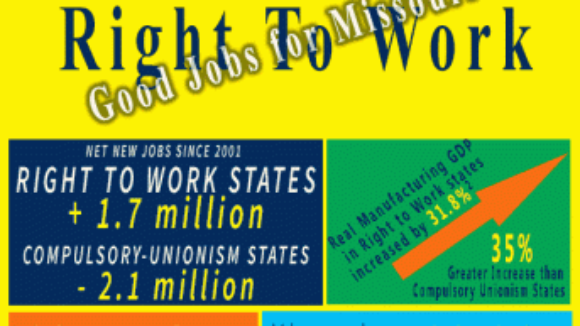
From the Missouri State House Republicans (click to download): Right to Work Freedom Will Creates Jobs for Missouri Between January 2009 and January 2013, Missouri lost 23,964 jobs,…
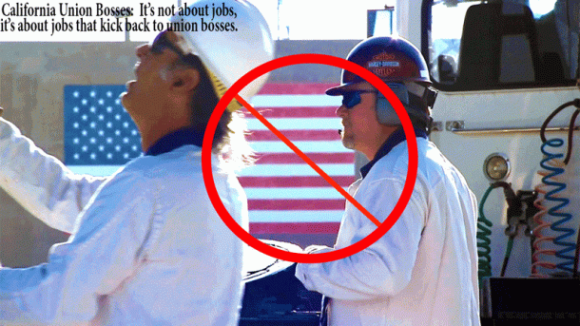
California Union Bosses Would Rather ‘Good-Paying Jobs Not Be Created, Than Let a Company . . . Go Nonunionized’ Like many of the Golden State’s mid-sized and smaller communities, Palmdale, a city of roughly 150,000 residents located in northern Los Angeles…

When 18-year-old college freshman Saira Blair is sworn in as a West Virginia House Delegate, she will become America’s youngest elected lawmaker. And, what is Delegate-elect Blair’s most important issue: I want to…
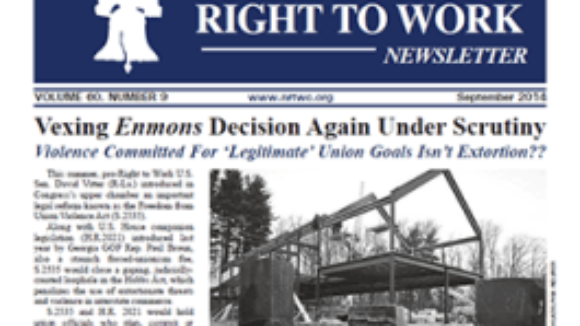
“Time and again, federal prosecutors have amassed extensive evidence that Big Labor bosses have orchestrated, authorized, and/or ratified violence, vandalism and threats for the purpose of securing forced-dues contract clauses or other union demands."
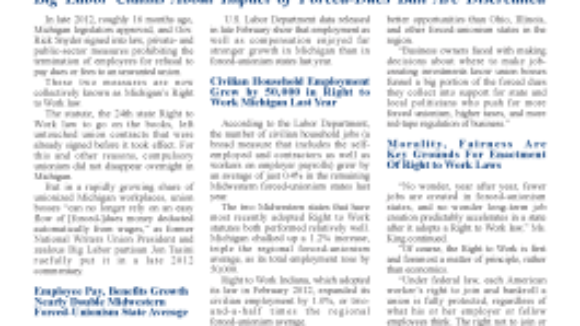
(Click here to download the April 2014 National Right to Work Committee Newsletter) Big Labor Claims About Impact of Forced-Dues Ban Are…
Rex Sinquefield is an American success story, now devoting his life to ensuring others can take advantage of economic opportunities just as he did. After growing up in the Saint Vincent Orphanage in St. Louis, Sinquefield went on to receive…
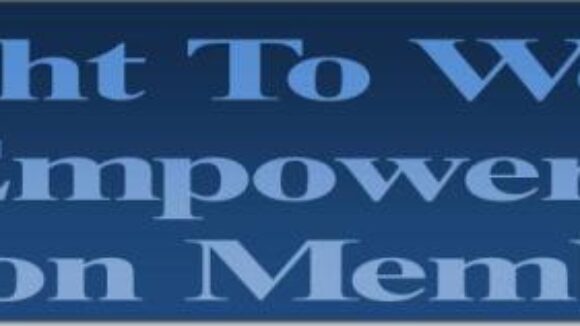
Why Right To Work Laws Are Important While Big Labor Bosses continue to pour forced-union dues into campaigns to stop Right To Work freedom, they also continue to shower Barack Obama with forced-dues money even-though Obama just killed a pipeline project that would have created jobs for 20,000 workers, many of which would be union members. If most of their members had the Right To Work, they could stop paying dues and force union officials to pay attention to union member jobs rather playing politics with union families' income. From Lachlan Markay's post: The Obama Administration’s decision to forego the Keystone pipeline has forced the country’s labor groups into a bitter civil war. At issue is the central purpose of the labor movement: those who feel it should represent workers in the workplace generally oppose the administration’s decision; those who see unions as primarily political organizations have generally supported it. Unions that had a stake in the Keystone decision were livid that the administration abandoned it, and equally angry at their fellow union members who had supported that decision, according to a Friday report from Politico Pro ($): “People are p****d,” said one U.S. labor official who supports the proposed TransCanada pipeline. “The emotions are really, really raw right now. This is a big deal.” “It’s repulsive, it’s disgusting and we’re not going to stand idly by,” Laborers’ International Union of North America General President Terry O’Sullivan told POLITICO. “The rules have changed. So we’ll react accordingly.”… But other top figures in the labor movement defended the decision. Their argument: re-electing President Obama is a higher priority than preserving union jobs, and to that end, unions had to prevent Republicans from gaining the upper hand on the top political issue of the day.

Why Right To Work Laws Are Important While Big Labor Bosses continue to pour forced-union dues into campaigns to stop Right To Work freedom, they also continue to shower Barack Obama with forced-dues money even-though Obama just killed a pipeline project that would have created jobs for 20,000 workers, many of which would be union members. If most of their members had the Right To Work, they could stop paying dues and force union officials to pay attention to union member jobs rather playing politics with union families' income. From Lachlan Markay's post: The Obama Administration’s decision to forego the Keystone pipeline has forced the country’s labor groups into a bitter civil war. At issue is the central purpose of the labor movement: those who feel it should represent workers in the workplace generally oppose the administration’s decision; those who see unions as primarily political organizations have generally supported it. Unions that had a stake in the Keystone decision were livid that the administration abandoned it, and equally angry at their fellow union members who had supported that decision, according to a Friday report from Politico Pro ($): “People are p****d,” said one U.S. labor official who supports the proposed TransCanada pipeline. “The emotions are really, really raw right now. This is a big deal.” “It’s repulsive, it’s disgusting and we’re not going to stand idly by,” Laborers’ International Union of North America General President Terry O’Sullivan told POLITICO. “The rules have changed. So we’ll react accordingly.”… But other top figures in the labor movement defended the decision. Their argument: re-electing President Obama is a higher priority than preserving union jobs, and to that end, unions had to prevent Republicans from gaining the upper hand on the top political issue of the day.
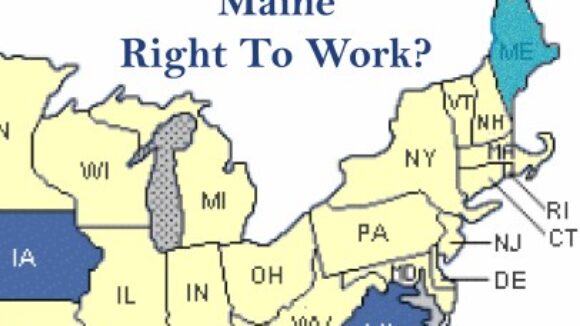
Like New Hampshire, Maine is looking to enact a Right to Work law. Writing for the Bangor Daily News, Matthew Gannon makes the case: Jobs, jobs, jobs. The first, last and often times only things on the mind of voters across the country right now are jobs. Politicians drone on endlessly about “job creation” and attack “job-killing policies” while voters punish those whom they perceive as being uninterested in improving the economy. Despite this, legislatures aren’t holding up their end of the bargain. Some minor things are being done that would help the jobs situation, but let’s be honest, a lot more could be done. Maine has a rather historic opportunity to lead on the issue of job creation, outflanking its more free-market neighbor, New Hampshire. Maine can, and should, pass a right-to-work law. Right-to-work laws exist in roughly half of the states in this country, mostly in the South and West. At their most basic level, these laws prohibit agreements between labor unions and employers which make membership in a union and payment of union dues a condition of employment. In other words, if you want a job but don’t want to join the union, you can’t be forced to as a condition of your employment. Imagine the opportunity that presents. Companies that want to bring their business to a northeastern state would have one option: Maine. That would be an incredible recruiting advantage that could help make Maine one of the most attractive places to do business in New England.Too often our laws have given special favors to unions, because unions play such a big role in elective politics. Unions funnel money into politicians who promise to help make unions more powerful, and in turn those same politicians make unions more powerful. It has always been a very incestuous “you scratch my back, I scratch yours” arrangement, to the detriment of workers.